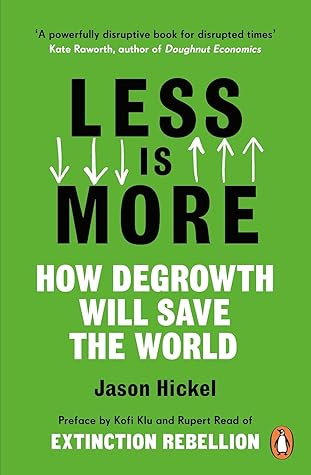More on this book
Community
Kindle Notes & Highlights
We don’t have a right to ask whether we are going to succeed or not. The only question we have a right to ask is what’s the right thing to do? What does this Earth require of us if we want to continue to live on it?
systems in history is that it’s organised around the imperative of constant expansion, or ‘growth’: ever-increasing levels of industrial production and consumption, which we have come to measure in terms of Gross Domestic Product (GDP).
Clean energy might help deal with emissions, but it does nothing to reverse deforestation, overfishing, soil depletion and mass extinction. A growth-obsessed economy powered by clean energy will still tip us into ecological disaster.
Dualist philosophy was leveraged to cheapen life for the sake of growth; and it is responsible at a deep level for our ecological crisis.
In other words, capital works according to a simple, straightforward formula: take more – from nature and from labour – than you give back.
Capitalism rose on the back of organised violence, mass impoverishment, and the systematic destruction of self-sufficient subsistence economies.
Poverty was recast not as the consequence of dispossession, but as the sign of personal moral failing.
There is nothing natural or innate about the productivist behaviours we associate with homo economicus. That creature is the product of five centuries of cultural re-programming.
The power of technology is that it enables capital and labour to be more productive – to produce more and faster. But it also speeds up the appropriation of nature.
It’s a self-reinforcing cycle – an ever-accelerating treadmill: money becomes profit becomes more money becomes more profit.
we live in a world that’s increasingly organised around the imperatives of accumulation.
GDP growth is, ultimately, an indicator of the welfare of capitalism. That we have all come to see it as a proxy for the welfare of humans represents an extraordinary ideological coup.
It’s not growth that’s the problem, it’s growthism: the pursuit of growth for its own sake, or for the sake of capital accumulation, rather than to meet concrete human needs and social objectives.
All that new clean energy isn’t replacing dirty energies, it’s being added on top of them.
According to data from the Climate Vulnerability Monitor, the South bears 82% of the total costs of climate breakdown, which in 2010 added up to $571 billion in losses due to drought, floods, landslides, storms and wildfires.
‘Climate change is, among other things, an unconscionable assault on the poor.’
Growth keeps outstripping our best efforts to decarbonise.
If we can find ways to share what we already have more fairly, we won’t need to plunder the Earth for more. Justice is the antidote to growth.
shorter hours are associated with greater gender equality, both in the workplace and at home.30
capitalism has a tendency to be anti-democratic, and democracy has a tendency to be anti-capitalist.
We are not the defenders of the river. We are the river.
There is no ‘it’ in such a world view. Everything is ‘thou’.


